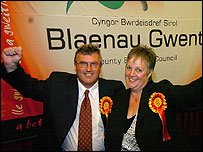By-election cry babies.
 Yesterday's by-elections were little more than humiliating for both of the main parties. Despite all the polls showing the Tories taking major leads over Labour, and Cameron gaining popularity all the time they haemorraged a massive 11,962 from their majority at the general election in Bromley. In Blaneau Gwent, the Labour candidate actually lost votes on the performance in the general election rather than gaining; the consolation was that Peter Law's successor, his former agent, lost nearly 8,000 votes.
Yesterday's by-elections were little more than humiliating for both of the main parties. Despite all the polls showing the Tories taking major leads over Labour, and Cameron gaining popularity all the time they haemorraged a massive 11,962 from their majority at the general election in Bromley. In Blaneau Gwent, the Labour candidate actually lost votes on the performance in the general election rather than gaining; the consolation was that Peter Law's successor, his former agent, lost nearly 8,000 votes.The Liberal Democrats and UKIP gained in Bromley, with Ben Abbots for the Libs gaining 1,620 votes, with Nigel Farage, the easy to dislike foghorn voiced UKIP candidate gaining 872. This resulted in Labour being pushed into 4th place - losing an astonishing 8,316 votes. Plaid Cymru were the only real winners in Wales - gaining 912 votes on their 2005 performance.
The main winner, as it often is in by-elections, was apathy. While turnout was still a reasonably impressive 51.7% in Blaneau Gwent, it was down 14.4% on last year. There was an even bigger drop in Bromley, where turnout touched only 40.5%, down nearly 25% from May 2005. It seems that both Conservative and Labour voters stayed at home. Whether this was down in Bromley to the belief that the Tories were unassailable or to the position Cameron is taking is obviously uncertain, but the increase in UKIP support was certainly boosted by them throwing a quoted £75,000 into their campaign. Dai Davies' loss of nearly 8,000 votes will be put down to apathy, as Labour showed no sign of any recovery in the valley. Their performance was not helped by the continuing anger over the initial all-wimmin shortlist that imposed the Blairite Maggie Jones on the consitutency, or the fact that the selected candidate currently works for drug company Pfizer, well known for its socialist business practices. The allegation that Law had been offered a peerage by Peter Hain to stand down, vehemently denied by the Welsh secretary, must also have rankled.
Neither of the two parties has either been truly honest about what happened to their support. Hazel Blears cried that Blaneau Gwent was a "unique set of circumstances" and represented a "family feud", which seems rather insulting considering that it was the Labour's arrogance which resulted in Law standing as an independent in the first place. That his death encouraged his wife to stand for the Welsh assembly seat he has also held (she won) shows how deep the feeling against the current New Labour leadership is. David Cameron has unsportingly decried the result in Bromley as down to Lib Dem dirty tricks, even though the Tory candidate had been widely criticised for having "3 jobs" and making a false declaration on his nomination form.
Will it change anything? It's incredibly doubtful. The Blairites and Blair continue to be in complete denial about the way they are viewed, and Alan Johnson has continued the current theme of warning against a shift to the left. Gordon Brown, despite how he might view it as being a bloody nose against Blair and not him, will likely be concerned about how Labour is currently stuck in a downward spiral which they show no signs of getting out of. The way he continues to throw off any hint that he might do things majorly different to Blair seems more than anything to suggest that there is very little he can do to stop New Labour's apparently inexorable decline. As for the Tories, the result will no doubt have come as a shock, having had one of their safest seats turned into a marginal - but it will doubtless be dismissed as a blip or the result of apathy, as detailed above.
The most heartening thing about the results for the neutral is that it shows the parties other than the main two continuing to gain support. While the possibility of proportional representation being introduced by either Labour or the Tories is almost unthinkable, it shows just how badly such a system is needed. What should be encouraging is the way that a hung parliament, leading to a possible Tory-Lib Dem coalition could bring about just that. Until electoral reform is tackled, a large number of the British population will continue to be disenfranchised. It can't come soon enough.

